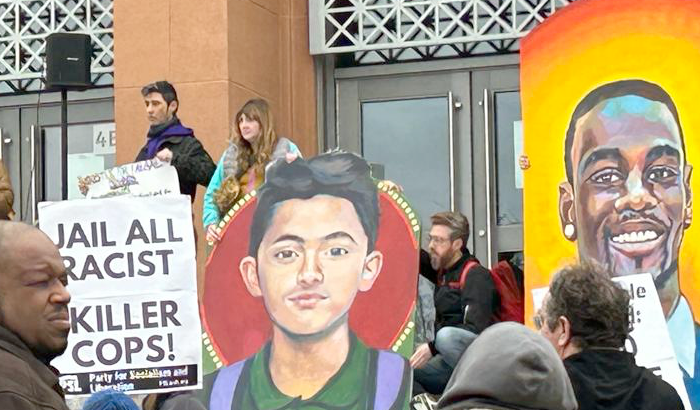
South Asian Workers’ Center activists call for “a different way of imagining justice” in the wake of CPD killing of Sayed Arif Faisal
Seven years ago, Sayed Arif Faisal immigrated to Somerville from Chittagong in Bangladesh. While he studied computer science at UMass Boston, he worked at CVS. His mother worked at Dunkin Donuts, and his father traveled back and forth to Bangladesh for his job.
On Jan 4, 2023, Arif was in the middle of a mental health crisis. Eyewitnesses say he was running outside his apartment with a knife aimed at himself. But to the Cambridge police, Arif could only be seen as a threat. Instead of calling in professional mental health experts or de-escalating the situation, the police shot him dead in broad daylight.
In the last two months, through our work with the South Asian Workers’ Center, we have felt the deep impacts of Arif’s killing, not just on his family, immediate relatives and friends, but also on the larger community—an ever-increasing sense of vulnerability, and a feeling of being forgotten. Like many other Black, Brown, immigrant, and other marginalized communities, our members have lost their trust that Cambridge can ever feel safe.
“Our South Asian community, especially the Bangladeshi community, has felt quite overwhelmed at times by the trauma, anguish, and outrage,” the Center’s coordinator, Yasmin, said. “The disturbing frequency of police brutality, and the relentless news coverage of Arif’s agitation, has been taking a real emotional toll on South Asian Workers Center’s members.”
“We don’t feel safe sending our kids outside in this city,” says Fauzia. “Poor Faisal was calling for help,” says Afruza.
Without more information from the City, there is still much we do not know about what happened that afternoon. Did the police attempt to de-escalate the situation, and how? Who was the officer who shot him? Did the officer have a prior record of abuse? Why were mental health experts not called? What we can imagine is that he was scared, and desperate, and alone.
Our work with SAWC has shown us that working-class South Asian community members in Cambridge want answers about why this happened. For many, Arif’s death seems like a poignant example of how the promise of the American dream has failed them—they wonder why they came to this country at all.
We also know little about what led to that moment. Why did Arif jump out of his apartment window with a knife? What happened before that moment of crisis? We join the calls to defund and demilitarize the police and fund Cambridge Holistic Emergency Alternative Response Team (HEART), which aims to respond to mental health crisis holistically rather than through policing. We need more humane response systems.
As we heal from this tragedy, we also need to think about how we provide the support and the resources and create the spaces to help people deal with trauma and its emotional and physical symptoms, outside of the police. What are the long-term systems and support networks working-class, Muslim immigrants of color need to thrive in the city? We need to deepen our attention to the mental health of working-class immigrant communities, and how it is shaped by economic precarity and racial violence—all made more painful by the ongoing COVID-19 pandemic.
An estimated 5% of the residents of Cambridge are South Asian. But even within the South Asian community, working-class people are frequently erased and overlooked, even as they face economic exploitation, racism, and Islamophobia every day. These intertwined exclusions create the conditions for the kind of crisis Arif faced.
We also need to make space for grief and healing. Amid so many ongoing tragedies, our members have been denied the space to grieve. Many of our community members have not even been able to talk about what happened, and, even now, are fearful of speaking out.
As sociologists, we know that to move forward we have to listen to our communities. Their ideas of reparative justice, their experiences of mourning and loss, and their hopes for their life in the city matter. We raise our voice against the police system and hope we can build a different way of imagining justice.
Jyoti Sinha teaches with the Sociology Department at UMass Boston and is the founder and director of the South Asian Workers Center (SAWC)-Boston. Gowri Vijayakumar teaches with the Sociology Department at Brandeis University and is an advisor to SAWC-Boston’s well-being and racial equity projects.
